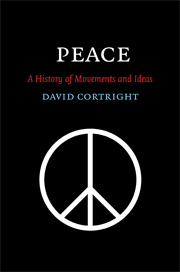7 - Banning the bomb
Published online by Cambridge University Press: 05 June 2012
Summary
With advent of the nuclear age the challenge of disarmament became enormously more urgent. At stake in the struggle to reduce armaments and prevent war was nothing less than The Fate of the Earth, as Jonathan Schell wrote, the very survival of human life. Among the first to speak out against the new horror of self-destruction were the atomic scientists who built the bomb. Their efforts were followed in subsequent decades by waves of citizen activism in the late 1950s and early 1960s and then in the 1980s, which produced some of the largest mobilizations for peace in human history. These movements generated the political pressure for arms control in the 1960s and 1970s and for arms reduction at the end of the 1980s that brought an end to the cold war. They established a nuclear taboo in politics and culture that generated enduring pressure on the nuclear weapons states to reduce and deemphasize their reliance on nuclear weapons. This chapter summarizes the history of the struggle to ban the bomb and examines further implications of the relationship between disarmament and peace.
THE SHOCK OF DISCOVERY
The explosion of the first atomic bomb at the Trinity site in New Mexico on 16 July 1945 had a transforming impact on the scientists and military officials who witnessed it. Robert Jungk observed in Brighter Than a Thousand Suns that many of those present – who otherwise professed no religious faith – “recounted their experiences in words derived from the linguistic fields of myth and theology.”
- Type
- Chapter
- Information
- PeaceA History of Movements and Ideas, pp. 126 - 154Publisher: Cambridge University PressPrint publication year: 2008

